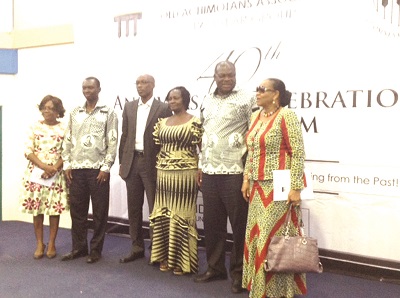Panellists call for broad-based education
 Panellists at a colloquium over the weekend all agreed that an educational system based on values was of more worth than one under which children were only taught to make grades and become professionals.
Panellists at a colloquium over the weekend all agreed that an educational system based on values was of more worth than one under which children were only taught to make grades and become professionals.
Advertisement
The panellists were the Vice Chancellor of the University of Ghana, Prof. Ernest Aryeetey; the former chief executive of the Ghana Chamber of Mines, Dr Joyce Aryee; the Executive Director of Africa 2000 Network/Managing Consultant Alpha Primus, Mr Edem Senanu, and the Senior Manager, Property Group West Africa, Stanbic Bank Ghana Ltd, Kofi Duodu Asomaning.
Prof. Aryeetey, in his presentation, expressed the view that "a broad-based education is always better than early specialisation”.
The colloquium was organised by the 1973 year Group of the Old Achimotans Association (OAA).
The trans-generational conversation on "The future of High School Education in Ghana: Learning from the past," offered the opportunity for the sharing of experiences from old Achimotans across generations.
Prof. Aryeetey, who represented the 1970s group, said the focus of all in education currently was for the learners to pass their examinations.
"Core educational values, thus, gain less attention, with students passing with great grades because all they are taught is to pass examinations," he said.
He said that aim was taken to the university, so that the sole motivation of students was to get a First Class.
"Cheating now has become a culture and at the university we spend a lot on CCTVs in examination halls.
"Many Ghanaians have degrees that do not belong to them, and titles they do not deserve," he stated.
He said beyond the great grades that made it possible to read medicine or law, there were values to be learned to enable all professionals to contribute to solving the challenges of society, and that transcended the passing of examinations and g attaining great grades.
Giving a historical view of past educational reforms, Prof. Aryeetey said various interests had pushed educational reforms of the past, so that galvanising support from the populace was not successful.
He mentioned the educational reform of 1987 and how the World Bank had pushed for it.
He said educational reforms were not for politicians or technocrats, but were for parents, students, civil society organisations, and so it was important for all to engage and discuss issues on education as they affected all.
"Educational reforms must be based on universally accepted values, much of what is done today is not based on any values," he said.
Dr Joyce Aryee, who represented the 1960 group of Achimotans, said the goal of education had to be to produce a well-rounded person who, in turn, could affect the society; anything else, she added, was not education.
She recounted experiences at Achimota, where various activities, including athletics, enabled students to compete with each other and learn to manage competition.
The two other speakers, Messrs Senanu and Asomaning, proposed a shift in teaching that would make students better engage with their communities.
While Mr Senanu, who is of the 1980s group of Achimotans, called for an educational platform organised every five years, where industry and educational institutions could engage, Mr Asomaning, who is of the 1990s group, called for a system of educating children, where education would be so attractive that children would learn outside the walls of classrooms.
The Minister of Education, Prof. Naana Opoku-Agyemang, who moderated the colloquium, said she had observed that Ghana had more reforms than other African countries. However, the country did not have the patience to see through the reforms.
She said education should actively engage students so that learning would not only be in the classroom.
Story: Caroline Boateng



